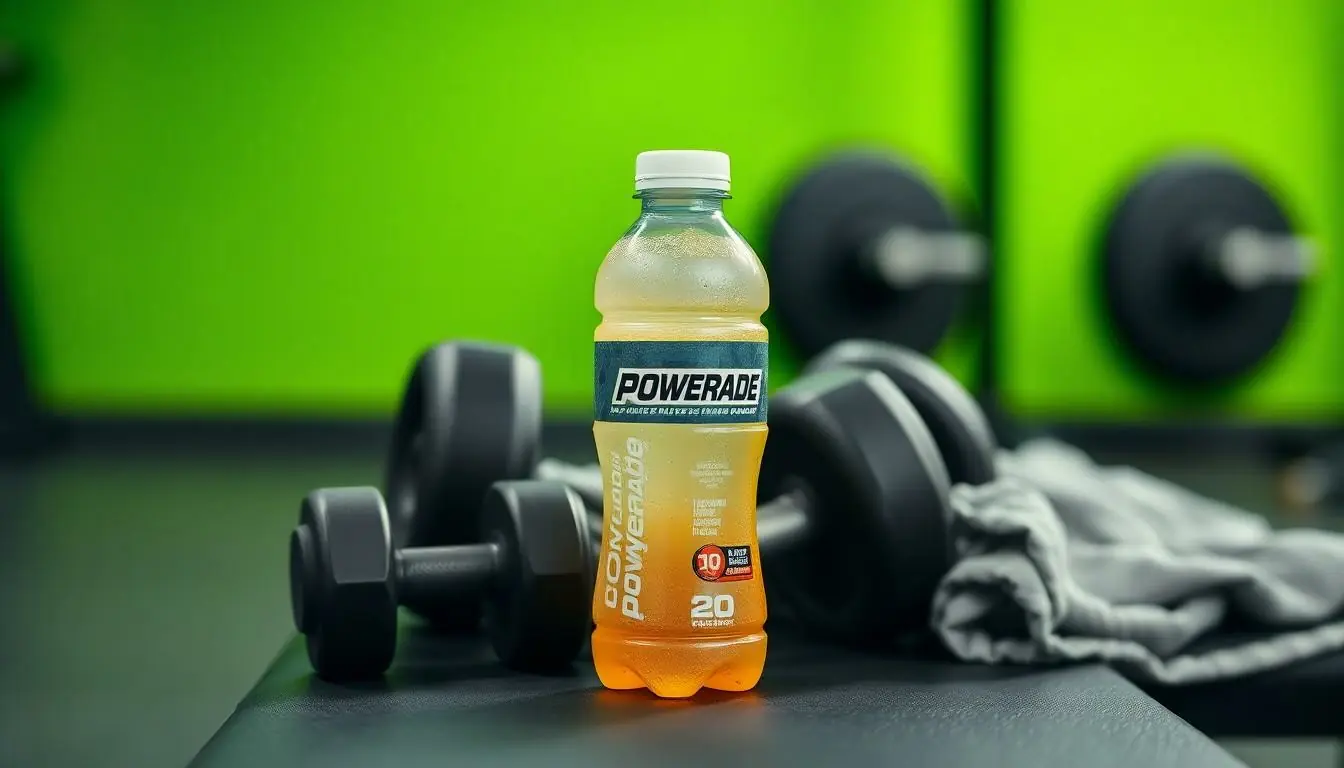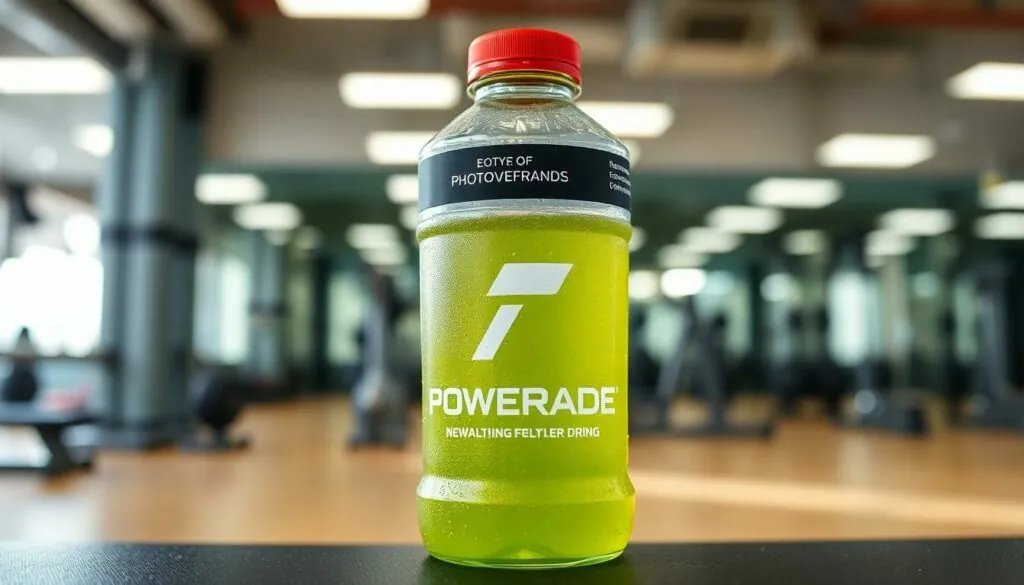When it comes to quenching thirst after a grueling workout or a long day, Powerade steps up to the plate like a hydration superhero. But what’s really lurking behind that colorful label? Is it a magical potion that’ll turn anyone into an athlete or just a sugary drink dressed in spandex? Understanding the Powerade nutrition label is key to making informed choices about what fuels those epic gym sessions—or Netflix marathons.
With a blend of electrolytes and flavors that could make even a cactus crave hydration, Powerade promises to keep you refreshed. But before diving in, it’s worth taking a closer look at the nutrition facts. After all, nobody wants to trade their performance for a sugar rush! So let’s unravel the mysteries of that label and find out what Powerade really brings to the table—or should we say, the sports drink aisle?
Table of Contents
ToggleOverview Of Powerade
Powerade is a widely recognized sports drink designed for hydration and energy replenishment. This beverage contains essential electrolytes like sodium and potassium, which help maintain fluid balance during physical activities. Nutritionally, a typical 20-ounce bottle offers approximately 130 calories and 34 grams of sugar, primarily from high fructose corn syrup.
The ingredients also include B vitamins, which support energy metabolism. Such nutrients provide athletes and active individuals with the necessary support for performance and recovery. Additionally, Powerade may include a variety of flavors, catering to diverse preferences.
A noteworthy aspect of Powerade is its formulation. The drink is designed to replace fluids lost during exercise and aids in recovery post-workout. Athletes often seek beverages that not only hydrate but also replenish lost electrolytes.
Comparatively, other sports drinks differ in their sugar content and electrolyte balance. Understanding the Powerade nutrition label allows consumers to assess how the drink fits into their overall dietary needs. Knowing the specifics helps in making informed choices about hydration strategies, especially during intense workouts or competitions.
Powerade can serve as a beneficial option when consumed in moderation. It is important to complement its intake with water and a balanced diet for optimal hydration and nutrition.
Nutritional Components Of Powerade

Powerade contains specific nutritional components that contribute to its effectiveness as a sports drink. Understanding these components helps in making informed hydration choices.
Calories
A standard 20-ounce bottle of Powerade contains approximately 130 calories. These calories primarily come from sugars, providing quick energy during physical activities. Athletes benefit from this energy boost, particularly during intense workouts or sports. Consuming Powerade post-exercise can help replenish calorie expenditure, aiding in recovery.
Sugar Content
Each bottle has about 34 grams of sugar. This sugar mainly originates from high fructose corn syrup. While it offers immediate energy, excessive sugar consumption can raise concerns regarding overall health. Balancing sugar intake through moderation ensures Powerade remains a supportive hydration option for active lifestyles.
Electrolytes
Powerade includes essential electrolytes like sodium and potassium. These minerals play a vital role in fluid balance during exercise. Sodium helps retain moisture in the body, while potassium contributes to muscle function. Proper electrolyte intake helps prevent dehydration and maintains performance levels, making Powerade a suitable choice for athletes.
Ingredients List
Powerade contains a mix of ingredients designed to enhance hydration and replenish energy. Analyzing these components helps consumers understand the impact of the drink on their diet.
Artificial Sweeteners
Powerade primarily uses high fructose corn syrup as its sweetening agent, contributing significantly to the overall sugar content. This type of sweetener provides quick energy, which can appeal to athletes during intense activities. It’s important to note that some variations of Powerade also include sucralose, an artificial sweetener. Sucralose offers sweetness without added calories, catering to those monitoring their sugar intake. However, individuals sensitive to artificial additives might want to consider this factor when selecting a beverage.
Preservatives
Powerade includes preservatives such as potassium sorbate, which helps maintain freshness and prevent spoilage. This additive ensures that the drink remains safe for consumption over time. Another common preservative, sodium benzoate, contributes to shelf stability, enhancing the drink’s longevity. While these preservatives are generally recognized as safe by health authorities, healthier options may exist for consumers looking to avoid such additives. Staying informed about these ingredients aids in making better hydration choices.
Health Benefits Of Powerade
Powerade serves as an effective option for hydration and energy replenishment, particularly during and after physical activity.
Hydration
Hydration remains a key benefit of Powerade, as it contains essential electrolytes like sodium and potassium. These electrolytes play a critical role in maintaining fluid balance, which is vital during intense workouts. While water helps in hydration, Powerade’s formula enhances electrolyte intake, preventing dehydration. A 20-ounce bottle replenishes lost fluids effectively and aids muscle function, making it advantageous for athletes seeking optimal performance. Moreover, consuming Powerade after exercise can help restore body fluids quickly, ensuring faster recovery times. By maintaining proper hydration levels, users can enhance endurance and overall athletic capabilities.
Energy Boost
Powerade provides a quick energy boost due to its sugar content, containing approximately 34 grams in each serving. This level of sugar delivers immediate energy, especially beneficial during strenuous workouts. When engaging in high-intensity activities, athletes often require a rapid source of calories, and Powerade fulfills this need effectively. The B vitamins within Powerade support energy metabolism, further enhancing its energy-boosting properties. Utilizing this sports drink during exercise or recovery can help maintain energy levels, allowing users to maximize their performance without experiencing fatigue. Balancing its consumption with a healthy diet can help mitigate concerns about excessive sugar intake.
Potential Drawbacks
Examining Powerade reveals some potential drawbacks despite its hydration and energy benefits.
High Sugar Levels
High sugar levels represent a significant concern with Powerade. A standard 20-ounce bottle contains 34 grams of sugar, primarily from high fructose corn syrup. This quantity accounts for around 25 percent of the daily recommended sugar intake for adults, which is 136 grams, according to the American Heart Association. Frequent consumption can lead to various health issues, including weight gain and increased risk of chronic conditions. Athletic performance relies on balance; while the sugars provide quick energy, excess intake could negatively impact overall health.
Artificial Ingredients
Artificial ingredients pose another concern for many consumers of Powerade. The drink often includes preservatives like potassium sorbate and sodium benzoate to enhance freshness and stability. While these additives are recognized as safe by regulatory authorities, some individuals may prefer to avoid these chemicals in their diets. Variations of Powerade sometimes use sucralose, an artificial sweetener, appealing to those monitoring their sugar consumption. Consumers seeking natural options might want to explore beverages with fewer artificial ingredients to align with their health priorities.
Powerade can be a valuable tool for hydration and energy replenishment during and after physical activities. Its blend of electrolytes and B vitamins supports performance and recovery for athletes and active individuals. However it’s essential to be mindful of its high sugar content and artificial ingredients.
By understanding the Powerade nutrition label consumers can make informed choices that align with their health goals. Moderation is key when incorporating Powerade into a balanced diet. This approach allows individuals to enjoy its benefits while minimizing potential drawbacks, ensuring they stay hydrated and energized without compromising their overall health.


